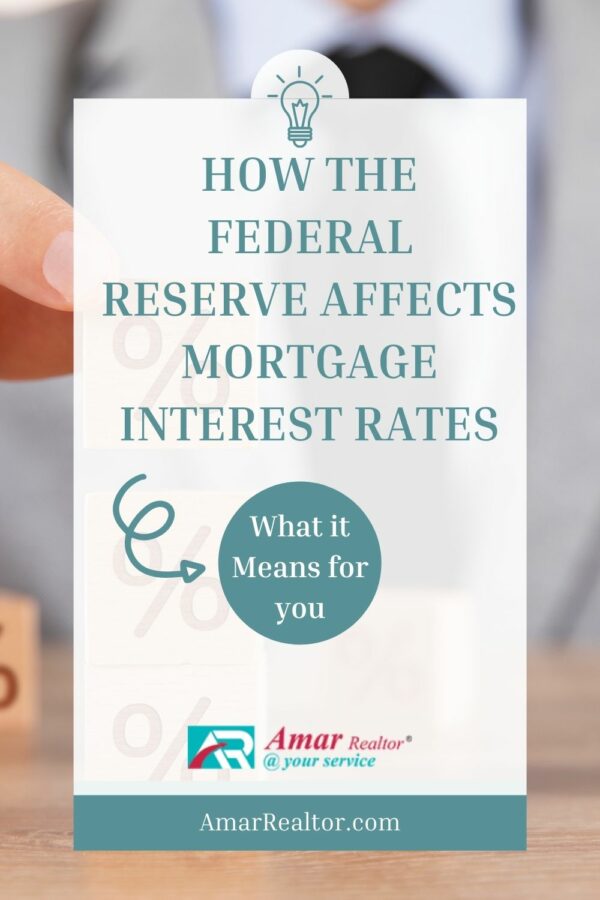How the Federal Reserve Affects Mortgage Interest Rates?
As you think ahead to buying a home, hearing about changes the Federal Reserve makes and how mortgage interest rates are expected to change are likely on your mind.
The Federal Reserve affects mortgage interest rates but does not directly set them. To understand how the process works, we’ve outlined it below.
What is the Federal Reserve?
The Federal Reserve, often called the Fed, is the United States central bank. It comprises 12 regionally located Federal banks and is responsible for setting monetary policy, supervising and regulating banks, and maintaining national financial stability.
What does the Federal Reserve do?
The Federal Reserve affects mortgage interest rates by setting financial policies to work toward goals like stabilizing prices and promoting sustainable employment. Some of the tools at their disposal to do this in such a way that affects mortgage interest rates include:
- Quantitative easing: After the global financial crisis of 2008, the Federal Reserve turned to quantitative easing to inject money into the economy. This controversial policy entails a nation’s central bank purchasing bonds or long-term securities from the open market to encourage lending and borrowing in a hurting economy.
- Federal funds rate: The Federal Reserve can influence the federal funds rate to impact the economy. This is the rate at which financial institutions like banks and credit unions can lend and borrow money overnight from each other to maintain reserve minimums. The individual institutions set their rates, and the average of all these rates makes the federal funds rate. While the Federal Reserve does not specify the speed, it can select a target rate and implement policies to work toward that target rate.
- Open market operations: The Federal Reserve can buy and sell government bonds to affect the economy. The Federal Reserve absorbs money from the system by selling bonds to target a higher federal funds rate. To target a lower federal funds rate, the Federal Reserve can buy government bonds by creating money and using it to buy bonds from the open market.
- Other tools: There are other tools the Federal Reserve can use to impact the economy, including raising or lowering the bank reserve requirements and changing terms for lending to banks.
What Doesn’t the Federal Reserve Do?
The Federal Reserve affects mortgage interest rates indirectly. It doesn’t set the interest rates for lending institutions. When you see headlines about the Federal Reserve lowering interest rates, remember this is a bit of an oversimplification.
There is a ripple effect when the Federal Reserve makes a change. When it becomes more expensive for banks and credit unions to borrow money, that expense is passed on to you as the consumer through interest rates. Your mortgage interest rate will be impacted by the Federal Reserve and the target Federal funds rate they set, but that is only one piece of the puzzle.
What Can You Do About Your Interest Rate?
The Federal Reserve affects mortgage interest rates offered to you, but it’s not the only factor. Be mindful of forecasted changes in the real estate market and be strategic with the timing of buying your home, but remember that you can control some elements of the mortgage process.
Your financial situation, including your income, employment history, debt-to-income ratio, credit score, and cash reserves, are some of the major factors that tell loan officers and underwriters what kind of borrower you will be. A mortgage interest rate just half a percentage point lower may save you thousands, so keeping your finances where they need to be is your best strategy.
To learn more details, let’s talk with Amar REALTOR®.
Let’s schedule a meeting with Amar REALTOR to review all your Real Estate objectives at a time that works for you.
 Please Click the link below to schedule a time on my online calendar!
Please Click the link below to schedule a time on my online calendar!
https://www.amarrealtor.com/meetingwithamarrealtor/
Contact Amar REALTOR® today for more information about Buying/Selling a Home in the Bay Area!
Amar REALTOR® offers expert real estate services with proven results in Bay Area Housing Market, including Homes for sale in Santa Clara County, San Mateo County, Contra Costa County, and Alameda County.
More Interesting Information about Bay-Area Real Estate
What is the San Francisco Real Estate Market Doing in 2022?
5 Things to Know About Bay-Area ADUs
What You Should Know About CA SB-9
